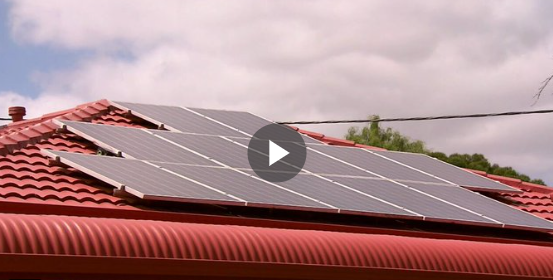SEIA (Solar Energy Industries Association): “Solar’s increasing competitiveness against other technologies has allowed it to quickly increase its share of total U.S. electrical generation—from just 0.1% in 2010 to over 6% today.”
The solar power industry in the United States is experiencing rapid growth, contributing significantly to the global effort to reduce reliance on fossil fuels and combat climate change. However, the residential rooftop solar sector is facing rising challenges that could slow down this progress. Complaints from customers have surged in recent years, particularly regarding aggressive sales tactics and deceptive financing practices, which are now under investigation by various state prosecutors.
It’s the solar scam ripping off hard working Aussies, dodgy middlemen putting installers out of business
Millions are being lost, but the government’s doing nothing.
Watch #9News at 6pm tonight for the full story. pic.twitter.com/SOwN5yLOCV
— 9News Adelaide (@9NewsAdel) August 14, 2024
Since 2018, one-star ratings on Solar Reviews have skyrocketed by over 1,000%, reflecting a growing dissatisfaction among customers. Allegations of fraud and forgery have emerged, with some customers claiming they were misled into signing contracts with unfavorable terms. These issues are now threatening the momentum of rooftop solar adoption, prompting some companies to take steps to restore the industry’s reputation.
Micah Gold-Markel, founder of Solar States, highlights the shift from the industry’s early days, which were driven by a desire to provide clean energy, to a market now marred by profit-driven motives and questionable practices. Larger companies have been accused of employing unethical sales and financing strategies that undermine consumer trust in solar energy.
Wood Mackenzie: “While high interest rates persist, the segment has some tailwinds, such as module oversupply resulting in lower pricing… the residential solar market will recover in 2025 and grow at an average annual rate of 10% between 2025-2028 as growth picks up in emerging markets.”
Prosecutors across the country are investigating these practices, acknowledging the potential environmental benefits of rooftop solar but condemning the dishonest tactics used by some companies. For instance, 91-year-old Emanuel Minto from Philadelphia fell victim to such practices when a door-to-door salesman misled him about the costs and benefits of a solar installation. The salesman allegedly forged Minto’s signature on an electronic contract, leading to unexpected financial burdens. Legal action has been taken against the companies involved, but the case highlights the broader issue of vulnerable consumers being exploited.
As customer complaints against solar companies continue to grow, state attorneys general are increasingly stepping in. The complexity of the complaints, combined with the fragmented nature of consumer protection in the solar industry, makes it challenging to quantify the exact number of dissatisfied customers. However, reports to the Federal Trade Commission involving the word “solar” have increased fourfold in recent years, indicating a significant rise in consumer dissatisfaction.
Rooftop solar has a fraud problem. The industry is working to build back trust https://t.co/NE57D5VwJH pic.twitter.com/bMZ9Fr4RMr
— Eric Vanderburg (@evanderburg) August 14, 2024
In response to these issues, some industry players are working to raise standards and improve transparency. Companies like Solar States are steering customers toward lenders that avoid hidden fees, while initiatives like Recheck aim to prevent unethical sales practices by tracking the history of salespeople across companies. Additionally, the Solar Energy Industries Association (SEIA) is developing new standards to ensure fair and transparent sales practices within the industry.
As the solar power industry continues to expand, maintaining consumer trust will be crucial. Efforts to regulate and standardize practices are underway, with the goal of ensuring that the industry’s growth benefits both the environment and consumers alike.
Key Facts and Stats on Solar in the U.S.
- Growth in 2023: The U.S. residential solar market saw a 24% year-over-year increase through the third quarter of 2023, driven in part by a rush in California to secure installations under the previous Net Energy Metering (NEM) policies before they changed in April 2023. However, this growth is expected to temper as the effects of higher interest rates and new policies, like California’s NEM 3.0, take hold in 2024.
- 2024 Projections: The residential solar market is expected to contract by around 12% in 2024. The contraction is largely due to persistent high interest rates, which are making solar installations less financially attractive for homeowners. Additionally, significant policy changes, particularly in key markets like California, are causing a slowdown in new installations.
- Future Outlook: Despite the challenges anticipated in 2024, the market is expected to recover by 2025, with an average annual growth rate of 10% projected between 2025 and 2028. This recovery is likely to be driven by emerging state markets and continued advancements in solar technology and storage solutions.
- Solar and Battery Storage: There is an increasing trend of pairing solar installations with battery storage. In 2023, around 11% of residential solar systems were installed with storage, and this trend is expected to continue growing as battery technology improves and becomes more affordable.
Major Points:
- The U.S. residential solar industry is facing a surge in customer complaints, particularly regarding aggressive sales tactics and deceptive financing practices, which are now under investigation by state prosecutors.
- One-star ratings on Solar Reviews have increased over 1,000% since 2018, highlighting growing dissatisfaction among solar customers, with some alleging fraud and forgery in their contracts.
- Industry pioneers like Micah Gold-Markel note a shift from the solar industry’s early, mission-driven days to a market now dominated by profit-driven companies employing questionable practices.
- Vulnerable consumers, such as 91-year-old Emanuel Minto, have been exploited by misleading sales tactics, leading to significant financial burdens and legal battles.
- In response to these issues, some solar companies and industry groups are working to improve transparency, raise standards, and ensure fair practices to restore consumer trust and sustain the industry’s growth.
Lap Fu Ip – Reprinted with permission of Whatfinger News



